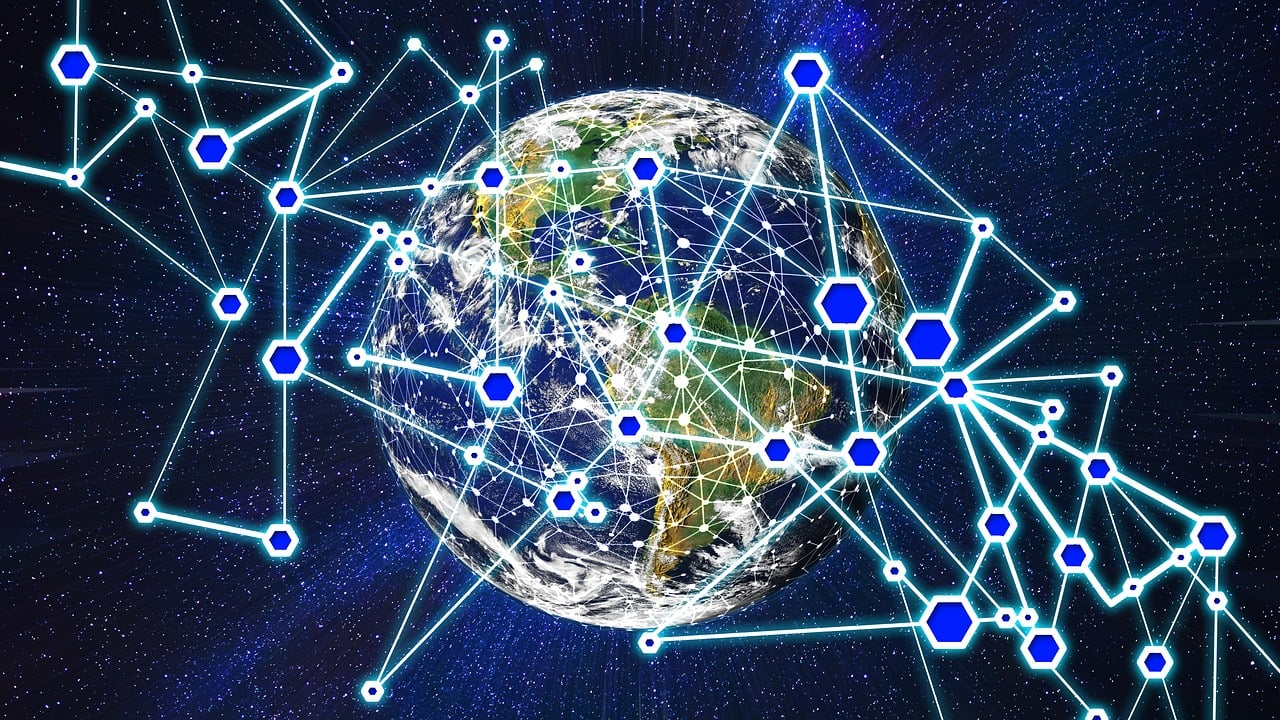
How easily do two dimensions superimpose on four, in a world connected by 2D “social” media technology? Image by Gerd Altmann, from Pixabay.
By James Myers
When he descends into the two-dimensional world of his “social” media platform X, displayed with length and width but zero depth on his screen, the world’s wealthiest human seems oblivious to the contempt that millions of ordinary people have for his antics.
As we’ve pointed out before, human living in four dimensions is immensely more complicated and beautiful than living a two-dimensional fantasy playing out on a screen. As adults, we have a duty to teach children the arts of cooperation and dealing with differences in a complex world, where living is not as simple as it can seem on shallow “social” media postings delivered to two-dimensional screens.
It’s a duty that’s especially important for the world’s wealthiest human and his X platform, particularly because he greenlit his posts to appear on the screens of hundreds of millions of users. He alone, and no other X user, holds this unlimited broadcasting power.

March 28, 2025 post by Elon Musk on his X platform is greeted with incredulity.
With great power, however, comes great responsibility. The responsibility to preserve democracy is crucially important now, with the rise of autocracy and tyranny that are draining power of the people.
With his assets currently valued at over $300 billion, Elon Musk can afford to broadcast million-dollar handouts to strangers in an attempt to increase votes for his preferred judicial candidate. He used a similar tactic in the 2024 U.S. federal election, encouraging voters to support his preferred presidential candidate.
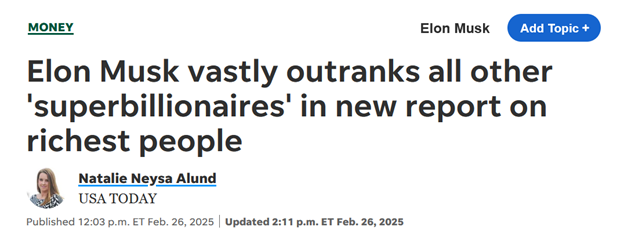
February 26, 2025 headline from USA Today
Such flaunting of financial wealth is not only extremely distasteful to ordinary folks like you and me who have to work to make ends meet, but a great many people would see it as evidence of moral bankruptcy. Technology makes the broadcasting of moral bankruptcy on social media free and easy, and many people – adults and children alike – fall victim to it.
The lure of a financial reward can increase victimization, and voters can be induced to surrender their own protection under the law.
Unlike most countries, in the United States some judges are elected. Vote-buying is illegal in democratic nations, for the obvious reason that the seedy practice subverts power of the people, by the people, for the people, and gives control to the vote-buyer. Vote-buying is especially subversive when it puts control of the legal system itself – the same legal system that currently outlaws vote-buying – in the hands of the buyer.
To borrow Musk’s phrase, it’s “super important” that a democracy’s legal system doesn’t fall under the influence of a few privileged and powerful people, because the law is the last refuge of the powerless.

As protector of the laws, the United States Supreme Court is the last refuge of the powerless in America. Image of the Supreme Court building by Joe Ravi, on Wikipedia.
Elon Musk’s two-dimensional X post offering the cash bonanza is not framed as a vote-buying scheme because that would land him in a lot of legal hot water, at least while the judges remain independent. Instead, he says it’s an expression of his “appreciation,” and it’s not illegal to give money to someone for doing something that you appreciate.
The reality is very different, however, in the four-dimensional world of human living where democracy is supposed to give power and protection to the people. In four dimensions, we know a vote-buying scheme when we see one, whatever the words on a two-dimensional screen say.
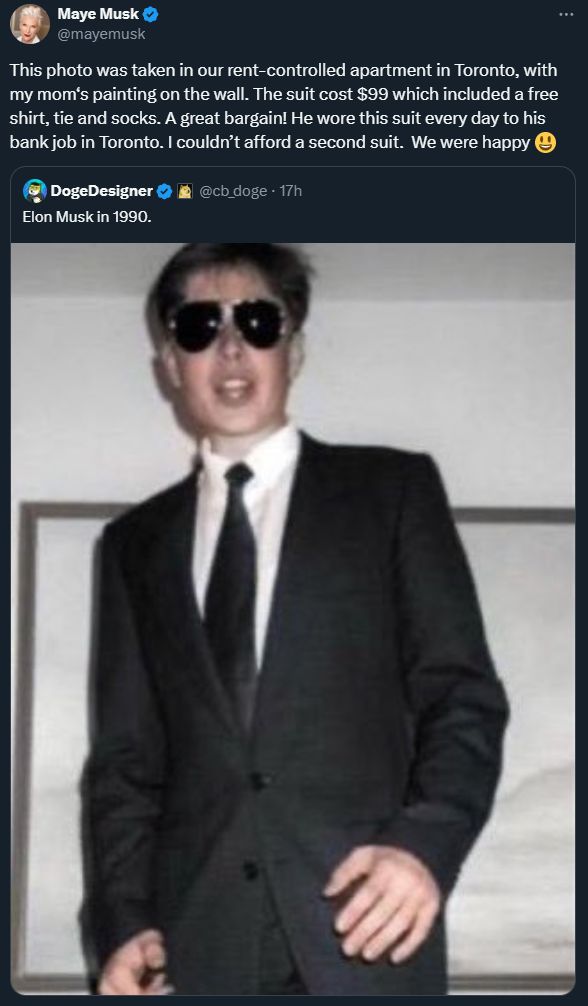
Photo of young Elon Musk, wearing a $99 suit and living in a rent-controlled apartment in Toronto, posted by his mother on X.
If he could see beyond the technology of his screen and look at the world from the perspective of an ordinary citizen, maybe the world’s wealthiest human would have a greater appreciation for the protection that democracy and an independent legal system can provide to billions of people who have nowhere near his power.
Maybe he would recall his own youth, living in an apartment in Toronto with the benefit of legal protection ensuring that his mother Maye wouldn’t face unaffordable rent increases. According to Maye’s post on X, picturing young Elon proudly sporting a bargain $99 suit with free shirt, tie, and socks, that was a happy time.
Happiness is not always bought with money.
Maybe he would understand that laws apply to the wealthy as much as they apply to the poor, and he would refrain from undermining the operation of law. Early in March, Reuters reported that in the previous month Musk had posted 30 times with personal attacks against judges. He called them “corrupt,” “radical,” and “evil,” and complained about the “TYRANNY of the JUDICIARY.”
Maybe he would appreciate that “free speech,” over which he claims to be an absolutist, can be especially damaging to children. If he could see himself as others see him, he would understand the contradiction of his own free speech position when he drives organizations like the Global Alliance for Responsible Media out of business with the threat of lawsuits when they publicly disagree with him or his X.
No doubt, the descent from four-dimensional living into a two-dimensional fantasy playing out on a screen can be exhilarating, at least for a period of time. Naturally, two dimensions impose far fewer constraints than four.
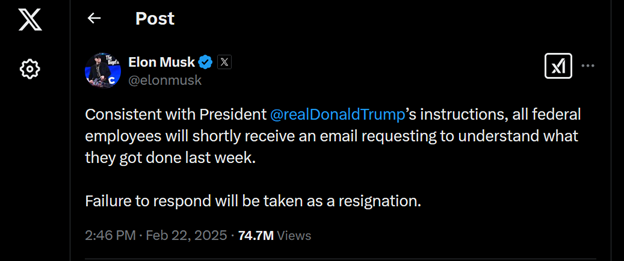
A February 22, 2025 post by the world’s wealthiest human on his X platform threatened 2.3 million federal employees with termination.
In four dimensions, shame is a huge constraint on the actions of ordinary people. We don’t do bad things because we don’t want others to perceive us as shameful. A shameful life is a lonely life, because good people don’t want to associate with bad people and that’s why practically nobody deliberately sets out in life to be bad.
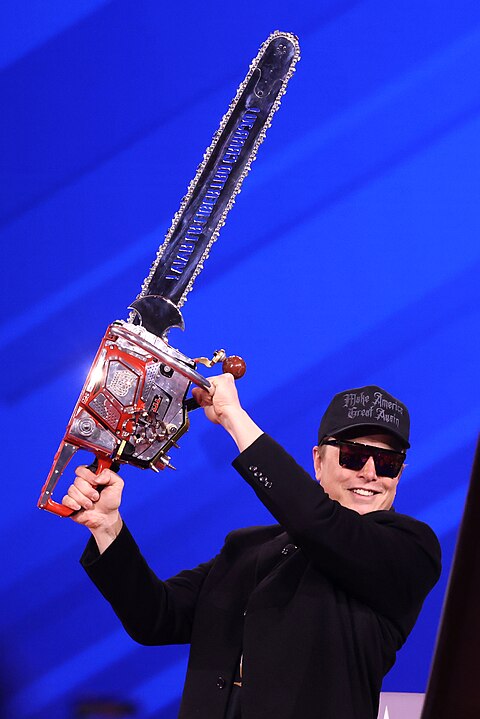
Elon Musk at the 2025 Conservative Political Action Conference, wielding a chainsaw symbolic of the mass layoffs and spending cuts that are the aim of his Department of Government Efficiency (DOGE). Photo by Gage Skidmore, on Wikipedia.
The two-dimensional technology of social media means that a broadcaster like the world’s wealthiest human doesn’t have to face the contempt that viewers can hold for the images and words on the screen. It means that the harm of “free speaking” that demonizes people is invisible to the broadcaster, who is oblivious to the long-term damage to children and adult victims that is wrought by the words and images.
The catastrophic failure of social media is that it doesn’t allow us to see when we’re being bad, at least in the eyes of others.
In your own mind, where you’re the star of your own universe, it’s easy to see yourself as good. But what really counts in the struggle and beauty of four-dimensional human co-existence is how others perceive your actions.
Newton’s third law of motion applies just as well in human relations: for every action there’s an equal and opposite reaction. Social media is designed to encourage extreme views that drive engagement and profit, with no accounting for the damage of the reactions that it provokes.



